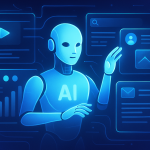Okay, picture this: it’s October 7th, 2025. The leaves are turning, pumpkin spice lattes are flowing, and Neel Kashkari, President of the Federal Reserve Bank of Minneapolis, is dropping some truth bombs about AI at the North Star Summit. He’s standing next to OpenAI’s chief economist, no less, which feels a bit like having Batman and the Joker share a panel on crime fighting. The burning question? Is AI about to snatch our jobs and leave us all playing dystopian bingo?
Kashkari, bless his heart, isn’t buying the hype. He’s seen the sci-fi movies. He knows the drill. But he’s also looking at the data, or lack thereof. While companies like Walmart are whispering sweet nothings about headcount freezes thanks to AI efficiencies, Kashkari’s not seeing legions of unemployed robots lining up for unemployment benefits. Yet.
But here’s the twist, and it’s a doozy. Even if AI doesn’t immediately trigger a mass exodus from the workforce, Kashkari’s worried about something else entirely: the sheer, unadulterated cost of building the AI utopia. Or, you know, the AI-powered dystopia. Whichever comes first.
Think about it. All those shiny new AI models need power. They need servers. They need data centers the size of small countries. And who’s going to pay for all that? Well, we are, indirectly. Kashkari’s concern is that this massive influx of capital into AI infrastructure could drive up borrowing costs across the board. Even if the Fed keeps cutting interest rates faster than a DJ at a rave, the demand for capital for AI projects could suck the oxygen out of other sectors, like housing. Imagine trying to buy a house when every investment firm is throwing money at the next sentient chatbot. It’s a recipe for economic indigestion.
He’s basically saying, “Hey, let’s not get so caught up in the AI gold rush that we forget about, you know, everything else.” It’s a valid point. We’ve seen this movie before. Remember the dot-com bubble? The housing crisis? Tech revolutions are great, until they aren’t.
Of course, Kashkari isn’t a lone wolf howling at the AI moon. He’s part of the Federal Reserve, which, last September, decided to shave a quarter-point off interest rates. He was all for it, and he’s advocating for more of the same. His reasoning? To protect the labor market. He’s not convinced AI is causing any job market slowdowns. He’s more inclined to blame tariffs, which, let’s be honest, have been about as popular as Nickelback at a music festival.
But even Kashkari has his limits. He’s wary of cutting rates too aggressively, fearing that we’ll end up with an overheated economy, high inflation, and unemployment rates so low that everyone’s too busy vacationing to actually produce anything. It’s a delicate balancing act, like trying to juggle chainsaws while riding a unicycle.
The AI Investment Boom: A Modern-Day Gold Rush?
The sheer scale of investment in AI is mind-boggling. We’re talking about billions, maybe trillions, of dollars being poured into everything from advanced algorithms to specialized hardware. It’s a modern-day gold rush, with every tech company and venture capitalist scrambling to stake their claim. But as history has taught us, gold rushes rarely end well for everyone. There are always winners and losers, and the environmental and social costs can be devastating.
This raises some serious questions. Are we investing too much, too soon? Are we creating an AI bubble that’s destined to burst? And, perhaps most importantly, are we considering the broader economic and societal implications of this technological tsunami?
The Human Cost of Automation: More Than Just Jobs
The debate about AI and jobs is often framed in purely economic terms. Will robots steal our jobs? Will AI create new, better jobs? But the issue is far more complex than that. It’s about the dignity of work, the sense of purpose that comes from contributing to society, and the potential for widespread social unrest if large segments of the population are rendered obsolete.
Think about the truck drivers, the factory workers, the customer service representatives. These are jobs that are increasingly vulnerable to automation. What happens to these people when their livelihoods are taken away? Do we simply retrain them to become AI prompt engineers? Is that even feasible? And what about the psychological impact of being replaced by a machine? It’s not just about losing a paycheck; it’s about losing a part of yourself.
The Ethical Minefield: Navigating the Uncharted Territory of AI
Beyond the economic and social implications, there are profound ethical questions surrounding AI. How do we ensure that AI systems are fair, unbiased, and transparent? How do we prevent AI from being used for malicious purposes, such as mass surveillance or autonomous weapons systems? And what happens when AI becomes more intelligent than humans? Will it still be aligned with our values and goals?
These are not abstract philosophical questions. They are real-world challenges that we need to address now, before it’s too late. We need to develop a robust ethical framework for AI development and deployment, one that prioritizes human well-being and protects against potential harms. And we need to have a global conversation about the future of AI and its impact on humanity.
The Future is Now: Navigating the AI Revolution
Kashkari’s comments serve as a crucial reminder that the AI revolution is not just about technological advancements. It’s about economics, society, ethics, and the very future of humanity. We need to approach this revolution with caution, foresight, and a healthy dose of skepticism. We need to ask tough questions, challenge assumptions, and demand accountability from those who are shaping the future of AI.
Because, let’s face it, we’re not just building machines; we’re building the future. And we need to make sure that future is one we actually want to live in. One where AI serves humanity, not the other way around. Maybe then, we can all enjoy that pumpkin spice latte in peace.
Discover more from Just Buzz
Subscribe to get the latest posts sent to your email.


